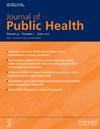儿童饮食行为(1-6 岁)与体重指数之间的关系:巴黎大区法国母婴保护中心的横断面研究
IF 3.6
4区 医学
Q1 PUBLIC, ENVIRONMENTAL & OCCUPATIONAL HEALTH
引用次数: 0
摘要
背景 早期发现促进肥胖的饮食行为模式可提高对高危家庭的识别和干预措施的实施。儿童饮食行为问卷(CEBQ)可以实现这一目标。目前还没有针对埃松母婴保护(PMI)中心跟踪的儿童使用 CEBQ 进行过研究。我们采用横断面设计,根据儿童的体重状况,调查了PMI随访儿童饮食行为的差异。方法 在母婴保护中心收集了一份针对家长的调查问卷。采用多元层次回归分析法研究儿童的 CEBQ 对体重指数(BMI)的预测性。结果 从2022年1月至4月,共选取了850名儿童,其中500名(1-6岁)为肥胖儿童,占10.6%。食物反应能力"、"享受食物 "与体重指数之间存在明显的正相关。相反,"饱腹感"、"进食缓慢 "与体重指数之间存在明显的负相关。此外,"接近食物 "和 "回避食物 "行为分别与体重指数 z 值呈正相关和负相关。结论 由于儿童的饮食行为因体重不同而存在显著差异,因此有必要提高家长对儿童饮食行为影响的认识。本文章由计算机程序翻译,如有差异,请以英文原文为准。
Relationship between children’s eating behavior (1–6 years) and body mass index: a cross-sectional study in French maternal–infant protection centers within the Parisian region
Background Early detection of obesity-promoting dietary behavior patterns improves the identification of at-risk families and the implementation of interventions. This is accomplished through the use of the Child Eating Behavior Questionnaire (CEBQ). No study has been conducted using the CEBQ in children followed in Essonne’s Maternal–Infant Protection (PMI) centers. We investigated, in a cross-sectional design, the differences in children’s eating behavior with PMI follow-up according to their weight status. Methods A questionnaire addressed to parents was collected in PMI centers. Multiple hierarchical regression analysis was used to investigate the predictability of the child’s CEBQ on body mass index (BMI). Results From January to April 2022, 850 children were selected, from which 500 (aged 1–6 years) were included, and of whom 10.6% were obese. There was a significant positive association between ‘Food Responsiveness’, ‘Enjoyment of Food’ and BMI. In contrast, there was a significant negative association between ‘Satiety Responsiveness’, ‘Slowness in Eating’ and BMI. Besides, ‘Food approach’ and ‘food avoidance’ behaviors were positively and negatively related to BMI z-scores, respectively. Conclusion Due to significant differences in children’s eating behavior according to their weight, it is needed to raise awareness among parents about their impact on them.
求助全文
通过发布文献求助,成功后即可免费获取论文全文。
去求助
来源期刊

Journal of Public Health
医学-公共卫生、环境卫生与职业卫生
CiteScore
7.40
自引率
2.30%
发文量
120
审稿时长
6-12 weeks
期刊介绍:
Previous Title Zeitschrift für Gesundheitswissenschaften, Previous Print ISSN 0943-1853, Previous Online ISSN 1613-2238.
The Journal of Public Health: From Theory to Practice is an interdisciplinary publication for the discussion and debate of international public health issues, with a focus on European affairs. It describes the social and individual factors determining the basic conditions of public health, analyzing causal interrelations, and offering a scientifically sound rationale for personal, social and political measures of intervention. Coverage includes contributions from epidemiology, health economics, environmental health, management, social sciences, ethics, and law.
ISSN: 2198-1833 (Print) 1613-2238 (Online)
 求助内容:
求助内容: 应助结果提醒方式:
应助结果提醒方式:


